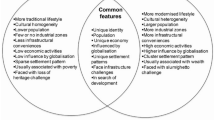Abstract
In this article, we present findings from 2 studies designed to explore gender-related socialization in Latino/a families. In Study 1, 22 adult Latinas (ages 20–45) completed in-depth interviews. In Study 2, 166 Latino/a college students (58% women; M age 21.4 years) completed self-report surveys. Study 1 findings suggest that many Latino/a parents socialize their daughters in ways that are marked by “traditional” gender-related expectations and messages. Results of Study 2, which included descriptive analyses and the creation of scales to explore family correlates of gender-related socialization, support and expand these findings. Male and female respondents described different experiences of household activities, socialization of gender-typed behavior, and freedom to pursue social activities or gain access to privileges. Parental characteristics, particularly gender role attitudes, were linked to gender-related socialization. Findings are discussed in light of the developmental and cultural literature on gender-related socialization.
Similar content being viewed by others
references
Amaro, H. (1988). Women in the Mexican-American community: Religion, culture, and reproductive attitudes and experiences. Journal of Community Psychology, 16, 6-20.
Arnett, J. J. (2001). Adolescence and emerging adulthood. Upper Saddle River, NJ: Prentice Hall.
Baca Zinn, M. (1995). Social science theorizing for Latino families in the age of diversity. In R. E. Zambrana (Ed.), Understanding Latino families: Scholarship, policy, and practice (pp. 177-189). Thousand Oaks, CA: Sage.
Comas-Diaz, L. (1987). Feminist therapy with Hispanic/Latina women: Myth or reality? Women and Therapy, 6(4), 39-61.
Darabi, K. F., & Ascencio, M. (1987). Sexual activity and childbearing among young Hispanics in the U.S. SIECUS Reports, 15, 6-8.
Day, J. C. (1996). Population projections of the United States by age, sex, race, and Hispanic origin: 1995 to 2050 (U.S. Bureau of the Census, Current Population Reports, P25-1130). Washington, DC: U.S. Government Printing Office.
Espin, O. M. (1984/1997). Cultural and historical influences on sexuality in Hispanic/Latin women: Implications for psychotherapy. In O. M. Espin (Ed.), Latina realities: Essays on healing, migration, and sexuality (pp. 83-96). Boulder, CO: Westview.
Flores, E., Eyre, S., & Millstein, S. G. (1998). Sociocultural beliefs related to sex among Mexican American adolescents. Hispanic Journal of Behavioral Sciences, 20, 60-82.
Harris, K. M., & Morgan, S. P. (1991). Fathers, sons, and daughters: Differential parental involvement in parenting. Journal of Marriage and the Family, 53, 531-544.
Hill, J. P., & Lynch, M. E. (1983). The intensification of gender-related role expectations during early adolescence. In J. Brooks-Gunn & A. C. Peterson (Eds.), Girls at puberty: Biological, psychological, and social perspectives (pp. 201-229). New York: Plenum.
Hovell, M., Sipan, C., Blumberg, E., Atkins, C., Hofstetter, C. R., & Kreitner, S. (1994). Family influences on Latino and Anglo adolescents' sexual behavior. Journal of Marriage and the Family, 56, 973-986.
Huston, A. C. (1983). Sex-typing. In E. M. Hetherington (Ed.), Handbook of child psychology: Vol. 4. Socialization, personality, and social development (4th ed., pp. 1-101). New York: Wiley.
Huston, A. C., & Alvarez, M. (1990). The socialization context of gender role development in early adolescence. In R. Montemayor, G. R. Adams, & T. P. Gullotta (Eds.), From childhood to adolescence: A transitional period (pp. 156-179). Newbury Park, CA: Sage.
Leaper, C. (1993). USCS Attitudes Toward Gender Scale. Unpublished manuscript, University of California at Santa Cruz (cam@cats.ucsc.edu).
Leaper, C., Anderson, K. J., & Sanders, P. (1998). Moderators of gender effects on parents' talk to their children: A meta-analysis. Developmental Psychology, 34, 3-27.
López, L. C., & Hamilton, M. (1997). Comparison of the role of Mexican-American and Euro-American family members in the socialization of children. Psychological Reports, 80, 283-288.
Lytton, H., & Romney, D. M. (1991). Parents' differential socialization of boys and girls: A meta-analysis. Psychological Bulletin, 109, 267-296.
Marin, B. V., & Gomez, C. A. (1997). Latino culture and sex: Implications for HIV prevention. In J. Garcia & M. Zea (Eds.), Psychological interventions and research with Latino populations (pp. 73-93). Boston: Allyn & Bacon.
Marin, G., Sabogal, F., Marin, B. V., Otero-Sabogal, R., & Perez-Stable, E. J. (1987). Development of a short acculturation scale for Hispanics. Hispanic Journal of Behavioral Sciences, 9, 183-205.
McDade, K. (1995). How we parent: Race and ethnic differences. In C. K. Jacobson, (Ed.), American families: Issues in race and ethnicity (pp. 283-300). New York: Garland.
McHale, S. M., Crouter, A. C., & Tucker, C. J. (1999). Family context and gender role socialization in middle childhood: Comparing girls to boys and sisters to brothers. Child Development, 70, 990-1004.
McHale, S. M., Crouter, A. C., & Whiteman, S. D. (2003). Topic review: The family contexts of gender development in childhood and adolescence. Social Development, 12, 125-146.
McLoyd, V. C., Cauce, A. M., Takeuchi, D., & Wilson, L. (2000). Marital processes and parental socialization in families of color: A decade review of research. Journal of Marriage and the Family, 62, 1070-1093.
Melchert, T. P., & Sayger, T. V. (1998). The development of an instrument for measuring memories of family of origin characteristics. Educational and Psychological Measurement, 58, 99-118.
Parke, R. D., & Buriel, R. (1998). Socialization in the family: Ethnic and ecological perspectives. In N. Eisenberg (Ed.), Handbook of child psychology: Vol. 3. Social, emotional, and personality development (5th ed., pp. 463-552). New York: Wiley.
Raffaelli, M., & Ontai, L. L. (2001). “She's sixteen years old and there's boys calling over to the house”: An exploratory study of sexual socialization in Latino families. Culture, Health, and Sexuality, 3, 295-310.
Raffaelli, M., & Suarez-al-Adam, M. (1998). Reconsidering the HIV/AIDS prevention needs of Latino women in the United States. In N. L. Roth & L. K. Fuller (Eds.), Women and AIDS: Negotiating safer practices, care, and representation (pp. 7-41). New York: Haworth.
Reid, P. T., Haritos, C., Kelly, E., & Holland, N. E. (1995). Socialization of girls: Issues of ethnicity in gender development. In H. Landrine (Ed.), Bringing cultural diversity to feminist psychology: Theory, research, and practice (pp. 93-111). Washington, DC: American Psychological Association.
Rossi, A. (1985). Gender and the life course. New York: Aldine.
Ruble, D. M., & Martin, C. L. (1998). Gender development. In N. Eisenberg (Ed.), Handbook of child psychology: Vol. 3. Social, emotional, and personality development (5th ed., pp. 933-1016). New York: Wiley.
Singer, M., Flores, C., Davison, L., Burke, G., Castillo, Z., Scanlon, K., et al. (1990). SIDA: The economic, social, and cultural context of AIDS among Latinos. Medical Anthropology Quarterly, 4, 72-114.
Taylor, J. M. (1996). Cultural stories: Latina and Portuguese daughters and mothers. In B. J. R. Leadbeater & N. Way (Eds.), Urban girls: Resisting stereotypes, creating identities (pp. 117-131). New York: New York University Press.
U.S. Department of Health and Human Services. (2001). Mental health: Culture, race, and ethnicity—Supplement to mental health: A report of the Surgeon General. Rockville, MD: Author.
Valenzuela, A. (1993). Liberal gender role attitudes and academic achievement among Mexican-origin adolescents in two Houston inner-city schools. Hispanic Journal of Behavioral Sciences, 15, 310-323.
Villaruel, A. M. (1998). Cultural influences on the sexual attitudes, beliefs, and norms of young Latina adolescents. Journal of the Society of Pediatric Nurses, 3, 69-79.
Wilds, D. J., & Wilson, R. (1998). Minorities in higher education 1997–1998. Washington, DC: American Council on Education.
Williams, J. E., & Best, D. L. (1994). Cross-cultural views of women and men. In W. J. Lonner & R. S. Malpass (Eds.), Psychology and culture (pp. 191-196). Boston: Allyn & Bacon.
Author information
Authors and Affiliations
Corresponding author
Rights and permissions
About this article
Cite this article
Raffaelli, M., Ontai, L.L. Gender Socialization in Latino/a Families: Results from Two Retrospective Studies. Sex Roles 50, 287–299 (2004). https://doi.org/10.1023/B:SERS.0000018886.58945.06
Issue Date:
DOI: https://doi.org/10.1023/B:SERS.0000018886.58945.06




